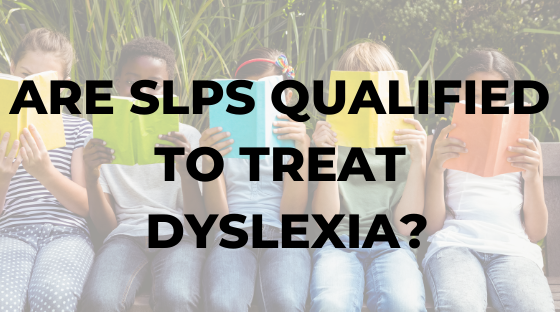Speech-language pathologists play an important role in language and literacy intervention for individuals with language processing disorders and dyslexia.
But if you’re an SLP, you may be struggling to get a clear answer as far as where exactly you fit in to the process.
That’s why I wanted to record this quick video for you to clear up some confusion.
SLPs and dyslexia: Is it within your scope?
Some people may not realize it, but providing evaluations and treatment for people with dyslexia absolutely falls within your scope as an SLP.
There are a lot of theories out there when it comes to what causes dyslexia. Some people will tell you it should be called “dysteachia”, and that it doesn’t really exist. In other words, they say the problem is with the teaching, not the student. Others will say that there are legitimate neurological differences causing the individual to process language differently.
While there are some people who may be erroneously diagnosed with a disability due to lack of quality instruction, we also know a couple other things for sure; one of them being that there is a common set of symptoms and characteristics associated with this diagnosis.
For example, we know these individuals tend to have issues with phonological and morphological processing and knowledge; and that those issues tend to make it harder for them to spell, read, and learn new vocabulary. All of which can have a significant impact on reading comprehension and performance on academic tasks as a whole. We also know that providing direct, intensive intervention in those specific areas improves vocabulary and reading comprehension.
What we do know is that these are language-based problems. As an SLP, you are a language expert. Because of that you are uniquely qualified to support people who have a dyslexia diagnosis, as well as provide the actual diagnosis itself.
Treating and diagnosing dyslexia: School vs Medical Settings
With that being said, there is some “red tape” to consider; mainly being the differences between school and medical settings.
If you’re a school practitioner, while you might be qualified to diagnose certain conditions based on your training and skillset, laws and policies may prevent you from actually using certain terminology in that particular setting. In the schools, we have to abide by the educational eligibility categories. We can’t necessarily use medical terminology and diagnoses. Dyslexia is considered a medical term, so we can’t diagnose it in the schools because it typically doesn’t fall in to one of those “educational eligibility” categories. Instead, we might have to use a more general term such as “specific learning disability”.
On the other hand, the student could get the same battery of assessments from someone with the same credentials with you in an outside medical setting, and come out with a “dyslexia” diagnosis merely based on where they got the evaluation.
This is HUGE because a lot of parents, educators, and students don’t understand this distinction; which means they may think one evaluation is “better” or more complete than another simply based on their perception of the credibility of a school vs. medical setting.
That being said, you and I both know that the quality of the evaluation in a school could be just as complete as an evaluation completed in an outpatient clinic; but not everyone else knows that. That’s why it’s so important to keep lines of communication open and educate the people we work with.
There are obviously pros and cons of both settings. For example, school practitioners may know the student better and therefore get a more complete perspective, but an outside evaluator may be able to spend more individualized uninterrupted time with the student provide a third party perspective.
The best case scenario is to get the best of both worlds and work together for both diagnosis and intervention.
Now that we’ve identified that a student has language-based issues associate with dyslexia, how should SLPs intervene?
The quick and dirty answer is that we provide them with direct instruction focused on those language-based areas I mentioned above (phonology, morphology, etc.).
But as you may know, there isn’t one cut-and-dry language therapy framework that SLPs can utilize. I struggled with this as well when I first started practicing.
That’s why I share the evidence-based language therapy framework I developed during my doctoral work on this free online training for SLPs.
ON this training I share:
>>>The top mistakes EVERYBODY makes when it comes to language therapy, and WHY they are confusing your students and burning you out.
>>>The SECRET I used to get BETTER RESULTS while doing LESS WORK that’s allowed me to help my students make major breakthroughs, while working a full-time SLP caseload and starting a business.
>>>My evidence-based framework for creating a “domino effect” that will amplify your language therapy, and help you break through language therapy plateaus without spending hours planning or doing research.

